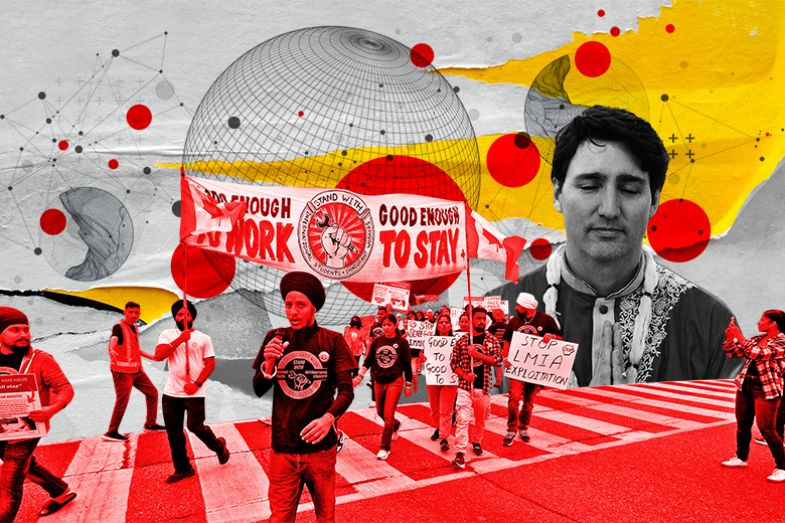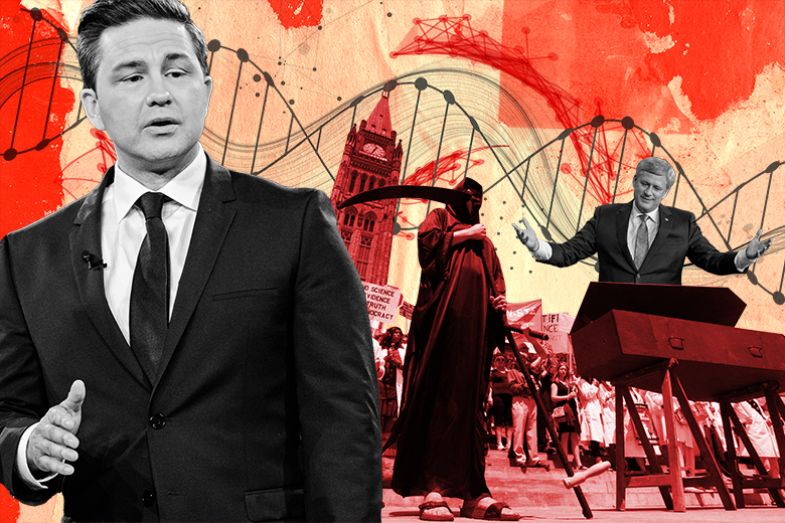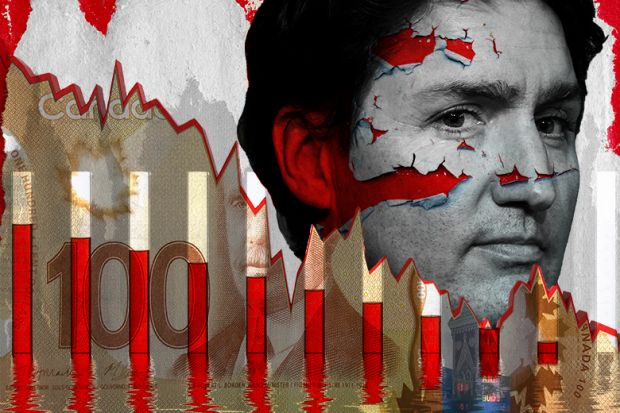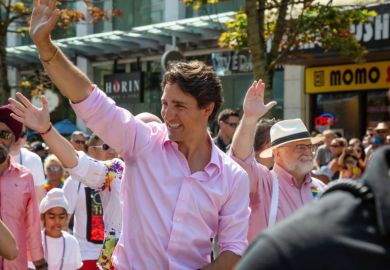When Justin Trudeau swept into office in 2015, the then 43-year-old – the second-youngest prime minister in Canadian history – promised “sunny ways” ahead for the country and its universities.
But Trudeau’s forced resignation a decade later comes amid a huge polling deficit for his Liberal Party, a historically welcoming nation turning against immigration, and new American president Donald Trump mooting the idea of annexing Canada and making it the 51st state of the US.
Indeed, such is the malaise that some in the higher education sector are hoping that the Conservative Party – which was heavily criticised for ignoring scientific evidence, “muzzling” government scientists and slashing blue skies and environmental research under Canada’s previous prime minister, Stephen Harper – will offer a more favourable environment for universities if, as opinion polls predict, it wins the next federal general election, due on or before 20 October.
Following his landslide victory in 2015, Trudeau warmed the hearts of scientists by pledging to “value science and treat scientists with respect” after a decade of perceived hostility that culminated in hundreds of scientists holding a mock funeral in Ottawa in 2012 marking “the death of evidence” in government. And his first few years in office drew applause as he launched a review of funding for fundamental science (known as the Naylor review), appointed a chief science adviser and introduced a “Model Policy on Scientific Integrity” to protect federal scientists from political interference.
He also made major investments in university and research infrastructure, and increased spending on fundamental research – even if that fell short of what Naylor recommended. His final budget last year was also warmly welcomed by the sector for providing an overall increase in research funding and increased support for graduate students.
But while the Trudeau government made substantive contributions to higher education and science, it could have been more effective and responsive to concerns, said Marc Johnson, professor of biology at the University of Toronto, Mississauga.
Johnson was also disappointed that the government only partially delivered on the recommendations of both the Naylor report and the Bouchard report, the 2022 product of a government-convened advisory panel on scientific research strategy that called for substantially more funding.
“The government has consistently been too reactive and lacked a long-term vision to make Canada a world leader in research, innovation and development,” Johnson said.
Gabriel Miller, president of Universities Canada, agrees. The government took steps to address the inadequate investment in research and in graduate students that the country has been dealing with for decades, he conceded. “But [those steps’] impact has been less than it would have been if the government had had a longer-term vision and a more consistent approach to communicating with and engaging the community.”
So while some of the Liberal government’s investments in science are “quite substantial”, they don’t amount to “a fundamental step forward for the country” because they were not sustained, Miller said, lamenting “the number of other priorities the government had on its plate and the difficulty [for the sector] of holding its attention”.
Alex Usher, president of Higher Education Strategy Associates, agreed that one of the lasting legacies of Trudeau’s administration has been its short attention span, calling it an “ADHD government”.
“What people remember is a lot of sporadically good ideas,” he said. “[Ministers] get kernels of good ideas, they get good half-ideas – and credit to them [for that]. But execution matters.”
According to Usher, Canadian universities lost all patience with the Liberal government over an 18-month period following the 2021 election, when ministers “went to sleep” on a range of higher education policy issues, culminating in a 2023 budget that was the worst for the sector in 25 years.
“They cut back student aid from an artificial high, but they did it in a sloppy manner and they did nothing on research, and it suddenly clicked for the whole sector: ‘Wait a minute, these guys aren’t necessarily on our side’,” Usher said. “That was around the time that the international student stuff was blowing up, which the government handled in a crude manner.”

After surging immigration numbers were blamed for triggering a housing shortage and imposing intolerable pressure on Canada’s healthcare system, immigration minister Marc Miller, a childhood friend of Trudeau’s, introduced a series of caps and other measures that are drastically reducing the number of new study permits issued to international students by Canada’s immigration authorities: cuts of 35 per cent last year have been followed by further cuts of 10 per cent this year, expanded to include postgraduates. Canadia eddtech firm ApplyBoard estimates that Canada already approved 45 per cent fewer study permits in 2024, compared with 2023.
Jacques Frémont, president and vice-chancellor of the University of Ottawa, said that after failing to deliver on his big promises for science, Trudeau launched a “wrecking ball” against the sector with the caps, which have serious consequences for universities’ bottom lines.
“Instead of having a surgical approach, they [launched] a sort of nuclear-bomb attack, so, overall, it’s a bit disappointing,” he said. “Canada’s brand has fallen dramatically in the last 18 months with foreign students…It will take some time to reinstall a certain level of confidence with parents and students.”
The international student caps were part of the Trudeau administration’s bid to decrease the proportion of temporary residents in the country, amid accusations that some education institutions were significantly increasing international student intakes to boost revenues.
Chad Gaffield, chief executive of the U15 Group of Canadian Research Universities, conceded that there has been abuse in some small colleges. However, the government’s response unnecessarily “blindsided” even universities that had managed foreign student enrolment well, he said.
“The government was unable to arrive at programmes and policies that actually targeted the so-called bad actors and did not cause collateral damage among the research universities,” he added. “So this has been a real blemish at the end of the Trudeau years that has kind of cast a lot of that decade in a bad light and is going to cause ongoing issues. We’ve been exceedingly concerned about this.”
While acknowledging that the political stakes around immigration issues are high, Daniel Jutras, rector of the University of Montreal, agreed that the execution of the government’s policy responses to the pressures was not perfect.
“The tendency to severely restrict the arrival of international students is affecting Canada, like the UK and Australia,” he said, referring to the UK’s ban on international students bringing dependants and Australia’s de facto cap on study visas.
“We would have preferred the Trudeau government to target institutions that abuse the system rather than research universities attracting the talented people this country needs,” Jutras said.
Universities Canada’s Miller believes the government’s widely acknowledged failings on immigration “will cast a shadow over [its] record on higher education and much more broadly than that, because being a country that effectively supports immigration is really fundamental to Canada’s identity and economy, and that’s been shaken by the problems we’ve seen unfold under this government’s watch.”
The Conservatives’ current leader, Pierre Poilievre, held several ministerial positions in the Harper government. However, some within higher education are hopeful that things might improve for the sector under a Conservative government.
Miller said there are hopes for a “reset” – particularly in Canada’s relationship with India, its most important international student market. Alongside the caps, strained diplomatic relationships have resulted in many Indians looking elsewhere.
“The confusion swirling around our immigration system in the past couple of years has to be repaired in order for the country to get back on track,” said Miller. “Nobody has a serious economic strategy for Canada that doesn’t require us to have strong recruitment of highly talented people from around the world. I’m optimistic that any government is going to have to sooner or later sit down and come up with a sustainable plan to restore support for immigration in Canada.”
With their lead in the polls, the Conservatives have remained largely tight-lipped around immigration. But “while we don’t have extensive details on what the policies of a Conservative government may look like, Mr Poilievre has repeatedly talked about how the Trudeau government has broken the ‘Canadian consensus’ on immigration, and he wants to return to the way it was in the Harper era”, according to Sarah Laframboise, executive director of Evidence for Democracy, a science policy non-profit. “I’m hopeful that this will translate into a system in which international students are still prioritised as a key demographic of opportunity for the Canadian workforce and aren’t used as a scapegoat.”
There is also hope among many in higher education that a Conservative government could deliver for science and research. While Miller conceded that the Harper administration had a troubled relationship with scientists working within the federal government, he said the reputation of Harper’s administration as “anti-university or anti-science” is unfair.

“Harper himself and his team engaged directly with universities a great deal – maybe more than the Trudeau government – and made some important strategic investments in universities and science,” he said. “There is work to do to bring the good elements of the Harper science policy to the fore with the next Conservative government and to work with them to build on it.”
Ottawa’s Frémont agrees that the Harper government was better for Canadian research than the Trudeau government was: “They had a rough start with the community, but after that, Mr Harper clearly understood what research was all about and its importance for the future of the country. I can’t say the same about Mr Trudeau. Trudeau was all talk – he said the right things: the problem was his government was not always walking the talk.”
As the country waits for the next election, the U15’s Gaffield said universities were in a “period of uncertainty”, but they should not necessarily be concerned by Poilievre’s silence on certain issues.
Higher education policy “is not a topic that is a real vote-getter. No one’s knocking on doors about this and getting a great response. This is something you’re going to do because you want to succeed in building a better future…and you know that in order to do that you need the talent, the expertise from our campuses.”
However, Michael Rennie, associate professor in biology at Lakehead University in Thunder Bay, said he has “zero faith” that a Conservative federal government would improve the situation in Canadian post-secondary institutions.
“Pierre Poilievre is a protégé of Harper and seems to represent many of the worst parts of the conservative movement, without much desire to consider facts or science in policy- or decision-making. He micromanages his party and messaging just like Harper did, if not worse.”
Rennie said a minority Conservative government might be unable to change much, but “all bets are off” if they win a majority. “I expect things will be far worse for science in this country: as bad as, if not worse than, they were under Harper.”
Though the Conservatives have been quiet on immigration and research, Poilievre has been vocal on cultural issues. Echoing Trump, the 45-year-old, who has held his parliamentary seat in Ottawa for over 20 years, has promised to “defund wokeism and fight antisemitism” in universities.
“The only thing we know about the Conservatives is that they don’t like wokes,” conceded Frémont. However, he is “hopeful that once we’re through the wokeness thing, we’ll be able to have a meaningful conversation with the new government”.
Usher suggests that the Conservatives’ belief in the power of technology – rather than taxation – to solve the environmental problem offers one possible way for universities to work with them. But like Republicans in the US and the right wing in the UK, conservatives in Canada “see political profit in beating up universities”, and Usher fears that a Conservative government’s actions may be inspired by the actions in office of Trump – who is widely expected to target universities that refuse to toe his line.
“There’s a range of risks here to the post-secondary sector…and I would personally say that the risks are probably [more] on the higher side than the lower side,” Usher said. “I do think these guys will find ways to do damage.”
One common recent flashpoint between universities and the political right has been their supposed failure to protect free speech on campus, and Miller agreed that Canadian Conservatives will want assurances that universities are upholding their commitments in that arena. He advised the sector to use the time between now and the election wisely, to make sure they are responding to popular concerns.
“The political changes in the country are a reminder to us that we need to spend some time listening to everyone in Canada – people who are thrilled with universities and people who have some questions or criticisms of them,” he said.
“It’s not a time for jumping up and down and demanding things. It’s a time to be listening and talking and building relationships for the future.”
Register to continue
Why register?
- Registration is free and only takes a moment
- Once registered, you can read 3 articles a month
- Sign up for our newsletter
Subscribe
Or subscribe for unlimited access to:
- Unlimited access to news, views, insights & reviews
- Digital editions
- Digital access to THE’s university and college rankings analysis
Already registered or a current subscriber?








